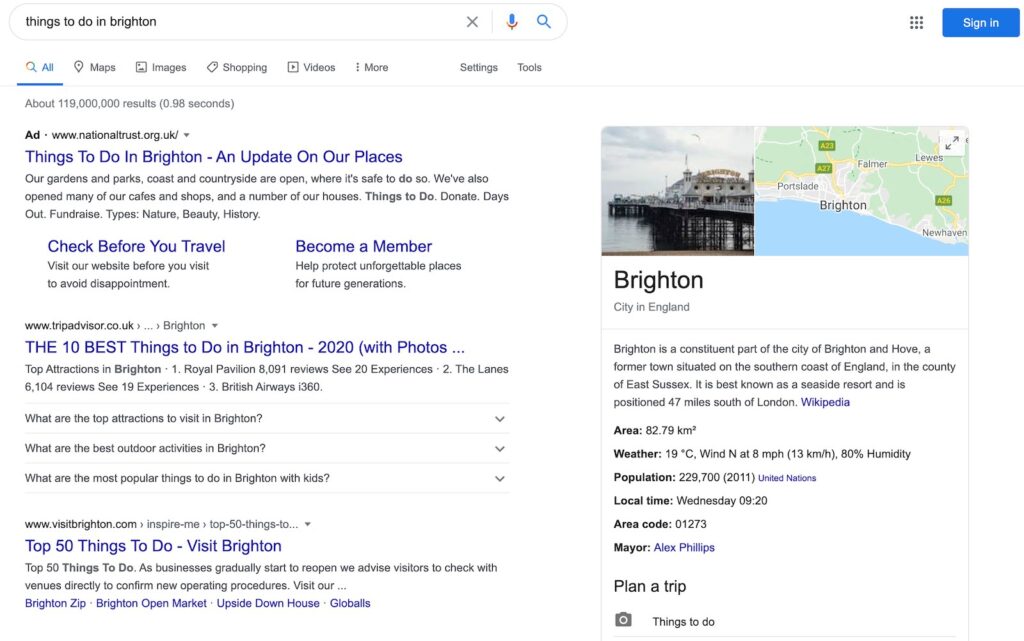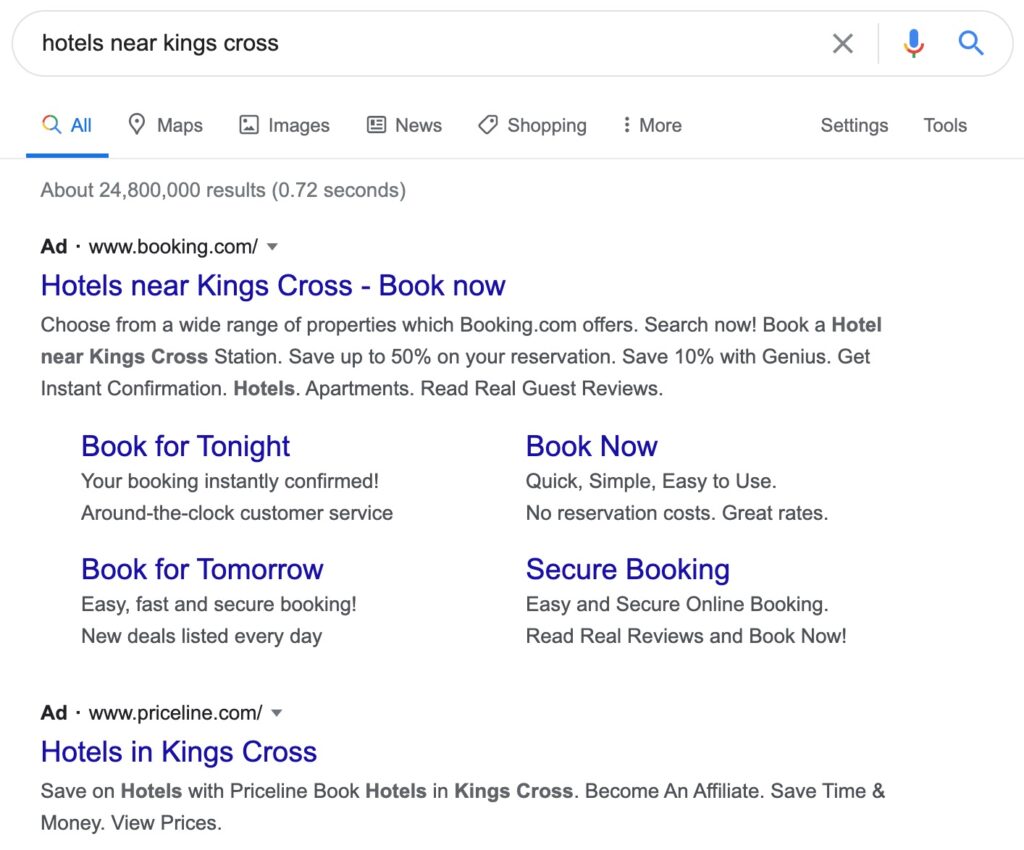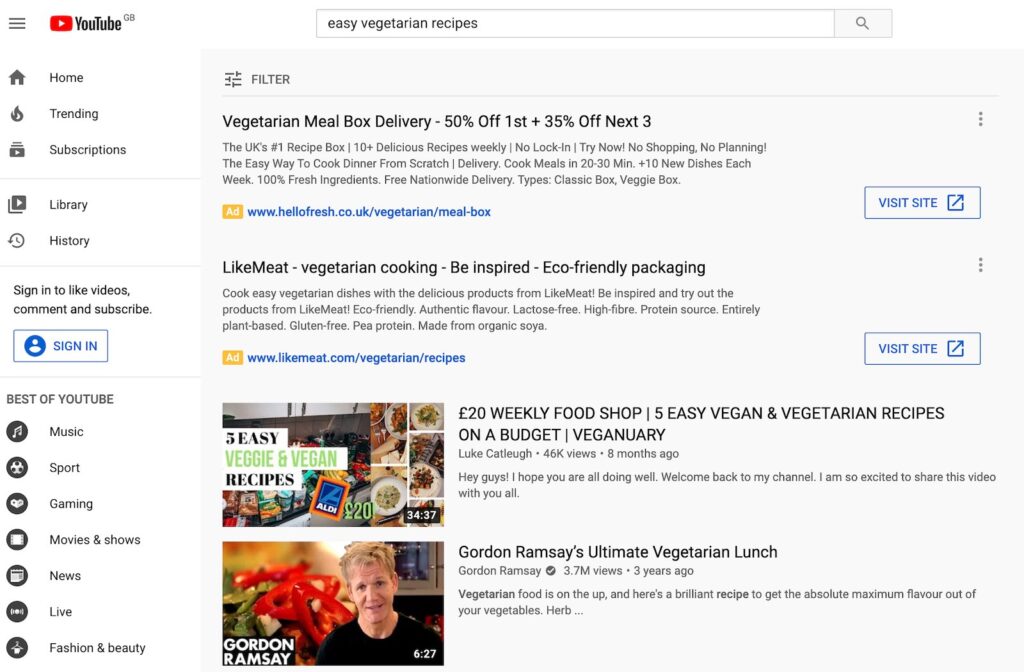
Whether you’re new to marketing or have been in the game for a while now, it can sometimes feel like the industry has its own language. From abbreviations like “CPC” to frequently used terms like “brand image”. It’s a literary minefield. We’ve compiled some important terminology to help you learn the lingo. A good understanding of these key marketing definitions will help you communicate with your marketing agency or in-house team. It’s also about improving communication which can lead to a well-rounded marketing strategy. Think of this as your own marketing glossary that you can keep coming back to when in doubt.
abbreviation
/ sɜrp /
Search Engine Results Page (SERP) is the web page that is generated when a user searches for a particular term within a search engine like Google. A user simply types their query into a search engine using specific terms/phrases which are known as keywords. And then boom. The page that is returned by the search engine is a SERP. You’ve been looking at SERPs every day and you didn’t even know it.
Why is this important for your marketing strategy? Well, on any given day Google alone receives over 63,000 searches per second. That’s 3.8 million searches per minute. 228 million searches per hour. 5.6 billion searches per day. 2 trillion searches per year. You get the gist. Of these searches, the vast majority of users (roughly 88%) don’t stray past the first results page with over a quarter (28.5%) clicking on the very first result. This means that your website needs to optimised for your main keywords in order to drive traffic to your site and ultimately pounds to your pocket.

abbreviation
/ sioʊ /
Search Engine Optimisation is a method of boosting the organic traffic to your website (organic meaning traffic that is not paid for through Paid Advertising - see definition further in this post). It’s the key to boosting where your website appears on SERPs. The difference between appearing on the first page of Google and having a slice of 88% of all traffic for your main keywords, or appearing on digital no man’s land… The dreaded page two and beyond.
SEO has lots of moving parts. It’s made up of both on-page and off-page strategies. On-page SEO includes keywords, content, and meta data (i.e. the meta title and meta description that appears in SERPs). And off-page SEO is made up of backlinks, social media, and third-party websites such as online directories. Through a well-balanced SEO strategy, businesses “earn” their spot in SERPs.
On average it takes four-six months to start seeing the results from a meticulous SEO strategy in search. That’s why a good on-page and off-page SEO strategy should be a constant feature in your overall marketing strategy.
abbreviation
/ɛsiɛm/
Search engine marketing (SEM) is a type of online marketing whereby a website is promoted through increased visibility on SERPs. It generally refers to paid search engine advertising, as opposed to organic methods such as SEO. But that doesn’t mean that you have to choose one or the other. In fact, a good online marketing strategy has a combination of both SEO and SEM. SEO drives what we call “evergreen traffic” at the top of your sales funnel whilst SEM pushes conversions at the bottom of your funnel.
In an increasingly competitive online marketplace, SEM is a great way to drive traffic to your website and grow your business.
noun
/ peɪd / / ˈæd vərˌtaɪ zɪŋ /
Also known as paid ads or search ads, paid advertising simply refers to any kind of online advertising that you pay for. Digital marketers and companies bid against each other in order for their ads to appear in desired locations online, for keywords that are relevant to their products and services.
This virtual bid occurs in the form of budgets that have been set by marketers when creating a paid advertising campaign. The highest bid for a particular keyword generally wins. And the cost is determined by how competitive the keyword is.
See search advertising and display advertising below.
noun
/ sɜrtʃ / / ˈæd vərˌtaɪ zɪŋ /
Also referred to as search ads, Search Engine Marketing is a type of paid advertising. Digital marketers and companies use search ads to appear on SERPs for specific keywords. Search ads can be a faster and more guaranteed way to appear at the top of SERP than SEO.
One of the downsides, however, is that they can get quite expensive over time, especially when compared to SEO strategies which are free. As with all paid advertising, it’s important to set a clear budget for SEM within your marketing strategy to ensure a good ROI (see definition further in this post).

noun
/ dɪˈspleɪ / / ˈæd vərˌtaɪ zɪŋ /
Display advertising is another type of paid advertising. Unlike search ads that appear in SERPs, display ads appear on a variety of websites and apps. For Google ads, this includes the entire Google Display Network which is millions of partner sites and apps such as Gmail, Youtube, Google Finance, and Blogger - which Google claims to reach 90% of all internet users.
Display ads are good for exposure and raising brand awareness as they get your brand in front of people. They’re also good for retargeting people that have visited your website previously. This is called a remarketing campaign and is a favourite amongst digital marketers because a warm lead is much easier to convert than a cold lead.

abbreviation
/pipisi/
Pay Per Click (PPC) is a model of paid advertising where advertisers pay a fee every time one of their ads are clicked. It’s a bidding strategy in online advertising. Here, you’re essentially paying for visitors’ actions instead of paying a flat fee or paying for exposure. PPC can be used within search, display and social media advertising such as Facebook, Instagram and LinkedIn ads.
PPC is often used as a name for search engine marketing. This is because SEM was the leading PPC channel when it first came out. It will come as no surprise, therefore, that the most popular PPC advertising system in the world is Google Ads. The platform allows digital marketers and companies to create ads that will appear in both search and display adverts within Google.
abbreviation
/sipisi/
Within PPC online advertising, cost per click (CPC) refers to the actual price of each click. It’s the amount that you’re going to be charged for a user visiting your website, clicking a phone number or simply interacting with your social media through an advert. In search engine marketing, the cost per click is determined by the demand for your particular keywords. The overall quality of your advert also has an impact on the CPC. That’s because search engines like Google reward advertisers who create targeted and relevant PPC campaigns, with a lower cost per click as they are actually useful to users.
Within Google Ads, an advertiser’s Ad Rank determines whether or not their ad appears on a page. This metric is based on their CPC bid, their maximum budget, and their quality score, which is a combination of relevance, click-through rate, and landing page quality.
CPC is very important when it comes to PPC campaigns and your overall digital marketing strategy as it has an impact on your margins and subsequent return on investment (ROI)...
abbreviation
/ɑroʊaɪ/
Return on Investment (ROI) refers to the ratio between the cost of an investment and the net profit generated from said investment. It’s important within business in general as it acts as a measure of how well a particular investment is performing.
Within marketing and digital marketing more specifically, ROI allows you to measure the success of campaigns based on website traffic and/or direct sales. This is an important factor in your marketing strategy as it means that you can continue to invest in successful campaigns, and even invest more into these campaigns. Whilst taking learnings from not-so-successful campaigns.
noun
/ brænd / / ˈɪm ɪdʒ /
Your brand image is the impression that existing or potential customers have of your business and/or product. This can be influenced by a variety of different factors from how you present your business (i.e. your logo, brand identity, the quality of your website, etc.) to word of mouth. It’s a very emotional association that people create based on their perception of your brand and it can change, for better or for worse, over time.
As with life, you want to put your best foot forward when it comes to creating a brand image. It should truly represent you, what your business stands for, what your target audience loves and everything else will (hopefully) fall into place. This will help you to build a brand that stands the test of time.
noun
/ (pəˈzɪʃənɪŋ) /
Within marketing, positioning relates very closely to your brand image. It’s the place that your brand occupies in the minds of existing and potential customers, compared to that of your competitors.
Market positioning is a crucial part of developing your marketing strategy. Setting an accurate positioning for your brand enables you to build trust amongst customers, whilst taking ownership of that space within the market from competitors. This is a strategic process that if done correctly, can make your brand successful for generations to come such as the great Coca Cola, Nike and Ford’s of this world.
We hope that you found this post useful. Feel free to bookmark it so you can keep coming back if you ever need to translate some marketing lingo into plain English. We’re also going to keep adding to this list of marketing definitions, so we’ll no doubt see you again soon.
We empower SMEs through dedicated digital marketing strategies and campaigns, which allow them to navigate the sometimes choppy waters of modern-day marketing. As experts in all things digital marketing, we love working closely with our clients to deliver results and a high ROI. If you need help or advice on how to promote your business, get in touch and we’ll be glad to help.